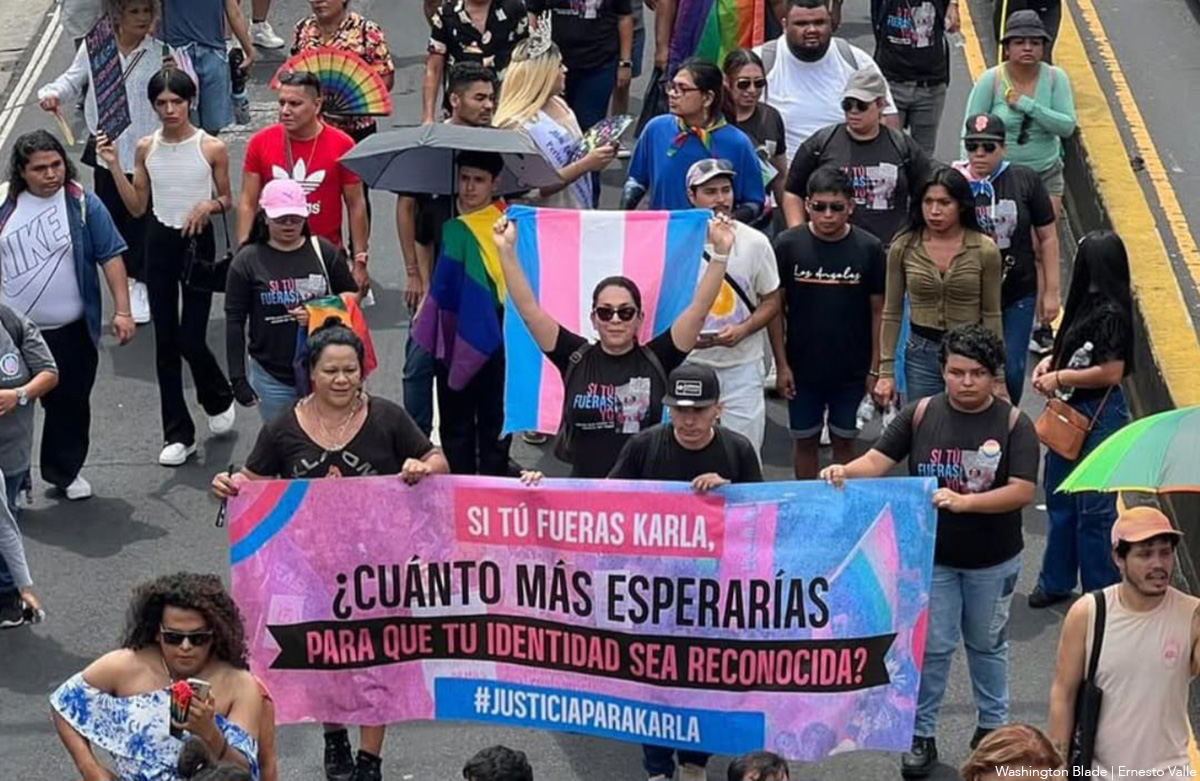World
Out in the World: LGBTQ news from Europe, Asia, and Australia
‘RuPaul’s Drag Race UK’ winner The Vivienne has died at 32

UNITED KINGDOM
“RuPaul’s Drag Race UK” winner The Vivienne, born James Lee Williams, has passed away at age 32, their representative Simon Jones says.
In a post on Instagram, Jones announced the star’s passing and requested privacy for Williams’s family.
“It is with immense sadness that we let you know our beloved James Lee Williams — The Vivienne, has passed away this weekend. James was an incredibly loved, warm-hearted and amazing person. Their family are heartbroken at the loss of their son, brother, and uncle. They are so proud of the wonderful things James achieved in their life and career,” Jones says.
“We will not be releasing any further details,” the statement says.
Williams was born in Wales but grew up in Liverpool, where they started their drag career in the late 2000s. In 2015, RuPaul appointed them “UK Drag Ambassador,” leading to them competing in and winning the first season of “RuPaul’s Drag Race UK” in 2019. She returned to the franchise in 2022 for the seventh season of “RuPaul’s Drag Race All Stars,” tying for seventh place.
The Vivienne also appeared on several other reality competition shows, including the 15th season of ITV’s “Dancing on Ice” and the Christmas edition of “The Great British Sewing Bee.” Their final TV appearance was last month on the Christmas edition of the UK game show “Blankety Blank.”
Beyond the screen, they released their EP “Bitch on Heels” in 2022, and toured as the Wicked Witch in the 2024 West End revival of “The Wizard of Oz.”
Tributes to The Vivienne poured in on social media in the wake of the announcement.”
“Heartbreaking 💔 I don’t know how to say how I feel,” wrote “Drag Race” judge Michelle Visage on Instagram. “My darling @thevivienne_ we go back to when I started coming over here to the UK. You were always there, always laughing, always giving, always on point. Your laughter, your wit, your talent, your drag. I loved all of it but I loved your friendship most of all. You were a beacon to so many.”
The death has come as a shock to many.
RUSSIA
Russian clubgoers have been fined for dressing “too gay” as part of the country’s ongoing crackdown on LGBTQ people and expression.
At least seven people were ordered to pay the fines after a raid on a nightclub in Tula, about 120 miles south of Moscow, in February 2024, according to independent Russian media outlet Verstka, which reviewed court documents and video footage of the raid.
Those fined were charged with “trying to arouse interest in non-traditional sexual relations,” which is a crime under Russia’s so-called “LGBT propaganda” laws. They included a man who wore “crosses of black tape glued to his nipples” and a “women’s style corset,” and another man who wore “pink socks” and “an unbuttoned kimono.”
Other offending wardrobe on men included a crop top, black leather shorts, and fishnet stockings.
A judge ruled their clothing was “’inconsistent with the image of a man with traditional sexual orientation,” and fined the men.
Two of the men were ordered to pay fines of 50,000 rubles (approximately $450). That’s a little more than the average monthly salary in Tula, according to Russia’s official statistics agency, Rosstat.
Russia’s crackdown on LGBTQ people has expanded dramatically over the last several years. The initial propaganda law targeted only expression that could be seen by children, but it was expanded in 2022 to criminalize all forms of LGBTQ organization and expression. In 2023, the Russian Supreme Court declared the “international LGBT movement” to be an “extremist” organization, which was backed up the following year with a decision labeling the “movement” to be “terrorist.”
Verstka reports that at least 131 cases of “LGBT propaganda” charges were brought to Russian courts in 2024, with fines ranging up to 200,000 rubles (approximately $1,850.)
SINGAPORE
LGBTQ activists are crying foul after the Singapore government introduced the island’s first workplace nondiscrimination bill without any protections for queer workers. The are calling on the government to amend the bill to add prohibitions on discrimination based on sexual orientation and gender identity before it passes into law.
A coalition of activists called SAFE (Supporting, Affirming and Empowering our LGBTQ+ friends and families) published a statement on its Facebook page calling on the government to rethink the bill.
“SAFE and our community partners who have co-signed this statement are resolutely against the bill’s exclusion of sexual orientation and gender identity as protected characteristics under the bill. We deem it as extremely discriminatory, which runs counter to the objective of the bill which is to address discrimination in the workplace in the first place,” the statement reads. “Often when parents share with us their fears for their children who have come out to them, discrimination against their queer or trans children rank high on the list. It is thus distressing for our parent community that the exclusions may inadvertently encourage discriminatory and bullying actions towards their children who are LGBTQ+ persons.”
SAFE’s statement also notes that unfair workplace practices also compound the discrimination that LGBTQ people face in other aspects of life, including in housing and education, which contributes to economic precarity.
Singapore’s Manpower Ministry says the new Workplace Fairness Legislation codifies existing, non binding guidelines on fair employment practices that were introduced in 2007, including prohibiting discrimination based on age, nationality, sex, marital status, pregnancy status, caregiving responsibilities, race, religion, language, disability, and mental health conditions. But those guidelines were issued 15 years before Singapore finally decriminalized homosexuality in 2022.
Singapore is home to one of the largest and most visible LGBTQ communities in southeast Asia, and the annual Pink Dot festival attracts thousands of people to celebrate Pride and demand greater rights.
AUSTRALIA
The Palace Hotel in Broken Hill has been officially recognized as an LGBTQ landmark for the role it plays in the iconic film “The Adventures of Priscilla, Queen of the Desert.”
In the 1994 film, a trio of drag queens stay at the hotel while driving their bus, the titular Priscilla, from Sydney to Alice Springs in the Outback.
Fans of the film have long flocked to the Palace Hotel — famous for its many murals — and the hotel even offers guests the “Priscilla Suite” where the characters stayed in the film.
Palace Hill was already listed on the New South Wales State Heritage Register, but this week Culture Minister Penny Sharpe announced that its listing would be amended to officially recognize the hotel’s significance to the queer community.
“The interior of the Palace Hotel, with its extensive murals, was a prominent filming location of ’The Adventures of Priscilla, Queen of the Desert,’” the new listing reads. “[The film] introduced LGBTQIA+ themes to mainstream audiences in Australia and internationally. ‘Priscilla’ represented a monumental shift in cinema of the representation of gay and transgender people in Australia.”
“The Palace Hotel has been closely associated with the LGBTQIA+ community and Australian drag artistry since the film’s release.”
Sharpe says the new listing honors the hotel’s importance in queer history.
“Now we’re ensuring its significant role in the history of Australia’s LGBTQIA+ community is officially recognized and celebrated,” Sharpe wrote in a post on Instagram.
Last year, it was reported in Deadline that a sequel to Priscilla was in the development, with the director and cast attached to return. It’s not yet known what the plot of the sequel will be, or if the queens will return to the Palace Hotel.
Spain
Spanish women detail abuses suffered in Franco-era institutions
Barcelona-based photographer Luca Gaetano Pira created ‘Las Descarriadas’ exhibit

A Barcelona-based photographer, audiovisual artist, and activist has created an exhibit that profiles Spanish women who suffered abuse in institutions that Gen. Francisco Franco’s dictatorship established.
Luca Gaetano Pira, who is originally from Italy, spoke with women who the regime, which governed Spain from 1936-1975, sent to Women’s Protection Board institutions.
The regime in 1941 created the board the country’s Justice Ministry oversaw.
Franco named his wife, Carmen Polo, as the board’s honorary president. Then-Prime Minister Felipe González fully dissolved the board in 1985, a decade after Franco’s death.
Gaetano’s exhibit is called “Las Descarriadas” or “The Misguided Women” in English.
“These are women who were detained between 1941 and 1985 for reasons that are unthinkable today: being lesbian, poor, pregnant out of wedlock, rebellious, politically active … or simply considered ‘morally suspect,'” Gaetano noted to the Washington Blade.
Groups affiliated with the Spanish Catholic Church ran these institutions. Gaetano pointed out they were “presented as social assistance centers.”
“In reality, they were spaces of punishment and forced reeducation, where isolation, unpaid work, and psychological violence were the norm,” he said. “Many of the survivors are still alive. Their testimonies are powerful, urgent, and of extraordinary current relevance.”
The regime sent more than 40,000 women to Women’s Protection Board institutions.
“Despite its seemingly benevolent name, it was in fact one of the most powerful instruments of moral and social control over women during and after the dictatorship,” notes the exhibit. “Under the guise of care and re-education, this institution functioned as a repressive apparatus that punished women who deviated from the ideal feminine model imposed by Franco’s regime: submissive, obedient, married, and dedicated to motherhood within the Catholic family structure.”
The Spanish Catholic Church last month issued a public apology, but Gaetano described it as “very soft” and noted “the women did not accept it.” Gaetano also compared the Women’s Protection Board institutions to Ireland’s Magdalene Laundries.
The Associated Press notes tens of thousands of “fallen” women were sent to the laundries that Catholic nuns operated in Ireland from the 18th century until the mid-1990s. Then-Irish Prime Minister Edna Kenny in 2013 issued a formal apology for the abuses that women suffered in the laundries and announced the government would compensate them.
The Spanish government has yet to offer compensation to the women abused in Women’s Protection Board institutions.
“My work focuses on recovering the historical memory of marginalized communities, particularly through the portrayal of survivors of institutional violence and the use of archival materials,” Gaetano told the Blade, noting he has also sought to highlight the repression that LGBTQ people suffered during dictatorships in Portugal and Latin America.
Gaetano’s exhibit can be found here:
Afghanistan
ICC issues arrest warrants for Taliban leaders over persecution of LGBTQ people, women
Groups ‘non-conforming’ with group’s gender policy targeted

The International Criminal Court on Tuesday issued arrest warrants for two top Taliban officials accused of targeting LGBTQ people, women, and others who defy the group’s strict gender norms.
The warrants are for Hibatullah Akhundzada, the Taliban’s supreme leader, and Afghanistan Chief Justice Abdul Hakim Haqqani.
“Based on evidence presented by the Office (of the Prosecutor), the judges found that there are reasonable grounds to believe that they have committed — by ordering, inducing, or soliciting — the crime against humanity of persecution, under article 7(1)(h) of the Rome Statute, on gender grounds, against girls, women, and other persons non-conforming with the Taliban’s policy on gender, gender identity or expression; and on political grounds against persons perceived as ‘allies of girls and women,’” reads an ICC press release that announced the warrants.
Karim Khan, the ICC’s chief prosecutor, in January announced a request for warrants against Taliban officials over their treatment of women and other groups since they regained control of Afghanistan in 2021. The request marked the first time the court specifically named LGBTQ people as victims in a gender persecution case before it.
“The issuance of the first arrest warrants in the situation in Afghanistan is an important vindication and acknowledgement of the rights of Afghan women and girls,” reads the press release the ICC released on Tuesday. “It also recognizes the rights and lived experiences of persons whom the Taliban perceived as not conforming with their ideological expectations of gender identity or expression, such as members of the LGBTQI+ community, and persons whom the Taliban perceived as allies of girls and women.”
A report that Outright International released in 2023 notes Taliban officials have systematically targeted LGBTQ people — especially gay men and transgender women.
Taliban officials have subjected them to physical and sexual assault as well as arbitrary detention. The Outright International report also notes Taliban authorities have carried out public floggings for alleged same-sex sexual relations, and have collected intelligence on LGBTQ activists and community members.
Artemis Akbary, executive director of the Afghanistan LGBTIQ Organization, praised the ICC.
“Today is a historic moment for LGBTIQ victims and survivors,” he said on social media.
El Salvador
#JusticiaParaKarla: una lucha por el derecho a la identidad en El Salvador
Karla Guevara inició su camino legal y personal en 2020

Cinco años han pasado desde que Karla Guevara inició un camino legal y personal para lograr que su nombre y género sean reconocidos en su Documento Único de Identidad (DUI). Cinco años de sentencias, apelaciones, puertas cerradas y vulneraciones que hoy se resumen en una sola palabra: resistencia.
En medio de un país que aún arrastra estructuras jurídicas y sociales poco sensibles a las realidades trans, Guevara se ha convertido en una voz visible. No solo por la denuncia pública de su caso, sino por su capacidad de transformar el dolor en acción: ha iniciado la campaña #JusticiaParaKarla, la cual acompaña con conversatorios llamados “Si tú fueras yo” en diferentes zonas del país.
Su historia se remonta al año 2018, cuando, junto a otras tres defensoras de derechos humanos —Mónica Hernández, Bianca Rodríguez y Verónica López— interpuso una demanda para lograr el cambio de nombre legal. La acción se inspiró en la Opinión Consultiva 24/17 de la Corte Interamericana de Derechos Humanos, que obligó a los Estados miembros de la OEA a garantizar los derechos de las personas trans, incluyendo el reconocimiento de su identidad.
A diferencia de sus compañeras, cuyo proceso fue resuelto favorablemente, Guevara fue la única a quien el Estado salvadoreño le negó el derecho, incluso tras contar con una sentencia favorable. El camino ha sido empinado, desgastante y doloroso, y ha implicado múltiples etapas legales con resoluciones contradictorias.
El 8 de enero de 2020, el juzgado declaró su demanda improponible. Guevara apeló el 22 de ese mismo mes, pero la Cámara de Familia desestimó su recurso. Aun así, perseveró. En abril de 2021 presentó una segunda apelación, y en septiembre se revocó la decisión del juzgado, ordenando admitir su demanda. Una pequeña luz parecía abrirse.
En agosto de 2022, después de varios peritajes que, según Guevara, incluyeron momentos donde se sintió expuesta y violentada, recibió una sentencia favorable: se autorizaba su cambio de nombre y género en la partida de nacimiento. Sin embargo, esta victoria fue parcial y breve. Aunque se ordenó marginar su partida, no se ordenó cancelarla como en otros casos similares.
El 4 de octubre de ese mismo año, la sentencia fue enviada al Registro del Estado Familiar. Pero la respuesta institucional fue sorprendente: el 3 de noviembre, la Alcaldía de San Salvador se negó a realizar el cambio. El jefe del registro y el registrador presentaron un amparo ante la Sala de lo Constitucional, paralizando el proceso.
“No solo me lo negaron, sino que ahora me exponen a un juicio aún mayor”, expresa Guevara. La frustración y la indignación fueron creciendo. En febrero de 2023, presentó una denuncia ante la Fiscalía General de la República, aunque lo hizo con poca esperanza. “Temía que no harían nada”, dijo. Y el 16 de abril de 2024, sus temores se confirmaron: la Fiscalía archivó el caso alegando que “no existe delito que perseguir”.
El 19 de noviembre de ese mismo año, Guevara decidió acudir a instancias internacionales y presentó su caso ante la Comisión Interamericana de Derechos Humanos. La CIDH ya notificó al Estado salvadoreño y le otorgó un plazo de cuatro meses para responder por qué no ha ejecutado el cambio ordenado por el juzgado.
“Obviamente no van a dar respuesta”, lamenta Guevara. Lo dice con la voz entrecortada, como quien ya ha llorado mucho, pero no ha perdido la voluntad de hablar. Reconoce que el proceso le ha afectado emocionalmente. “Cada vez que hablo de esto se me corta la voz”.
Las heridas no solo vienen de las oficinas estatales, sino también de las calles. Las miradas, los comentarios, el momento de presentar el DUI en cualquier trámite. “Es como si cada vez tuviera que explicar mi existencia. Es un juicio constante sobre quién soy”.
Guevara no está sola. Reconoce que hay otras personas trans en la misma situación. “Lo preocupante es que solo pasa en algunas zonas del país. En otras ha habido casos exitosos”, afirma. La disparidad en el trato revela una preocupante arbitrariedad institucional.
Uno de esos casos exitosos es el de Valeria Mejía, coordinadora de monitoreo y evaluación de ASPIDH. Su DUI ya refleja su nombre identitario, aunque no su género.
“Cuando recibí mi DUI con el nombre que me identifico pensé: aquí empieza una nueva vida”, relata.
Para Mejía, el cambio fue profundamente simbólico. “Uno ve pasar toda su vida frente a los ojos. Toda la discriminación, todos los rechazos. Sentí que algo sanaba”. A pesar de ello, su género asignado al nacer sigue apareciendo en el documento, lo que le genera inseguridad.
“El problema es que tengo que ir a todas las instituciones donde aparezco con mi nombre anterior. En el Seguro Social, por ejemplo, aún estoy registrada con el nombre masculino y no pueden atenderme, aunque el número del DUI sea el mismo”, explica.
Casos como los de Guevara y Mejía visibilizan una problemática estructural: el Estado salvadoreño no garantiza de forma uniforme el derecho a la identidad de las personas trans. Las resoluciones favorables son solo el primer paso. Su implementación efectiva aún tropieza con prejuicios, burocracia y omisiones.
Con la campaña #JusticiaParaKarla, la activista busca más que una solución a su caso personal. Busca generar conciencia, exigir coherencia legal y empujar una transformación cultural. En la marcha del 17 de mayo contra la LGBTIfobia, su presencia se hizo notar con camisetas, banners y mensajes que interpelan directamente al sistema.
Guevara ha hecho de su cuerpo, su voz y su historia una herramienta de resistencia. En cada conversatorio de “Si tú fueras yo”, invita a imaginar, a empatizar, a incomodarse.
“Lo que me pasa a mí le puede pasar a cualquier persona trans. Y si el Estado no nos reconoce, nos niega también la posibilidad de existir plenamente”, expresa.
Hoy, la resolución está en manos de la CIDH y el tiempo corre. La lucha de Guevara ya no es solo por una partida de nacimiento. Es por el derecho a ser, a vivir sin miedo, a que el nombre que la representa no siga siendo un motivo de juicio, burla o rechazo.
Mientras tanto, sigue esperando. Sigue alzando la voz. Sigue sembrando esperanza en quienes vienen detrás. Porque como ella misma dice: “Esto no se trata solo de mí. Se trata de justicia”.
-

 Federal Government1 day ago
Federal Government1 day agoTreasury Department has a gay secretary but LGBTQ staff are under siege
-

 Virginia2 days ago
Virginia2 days agoDefying trends, new LGBTQ center opens in rural Winchester, Va.
-

 Opinions3 days ago
Opinions3 days agoUSAID’s demise: America’s global betrayal of trust with LGBTQ people
-

 Travel4 days ago
Travel4 days agoManchester is vibrant tapestry of culture, history, and Pride










